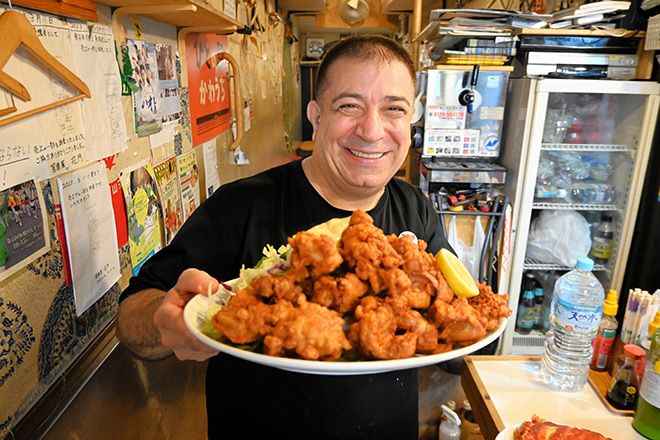Super-sized servings of tasty dishes at a throwaway price sound too good to be true, especially with the cost of living going through the roof.
But that is precisely what Mansour Kordbacheh offers at his “izakaya” in Tokyo’s Itabashi Ward.
There, a 1.5-kilogram serving of karaage fried chicken costs 400 yen ($2.70).
That’s not a typo. The sum even includes tax.
Not surprisingly, the tiny eatery that has confounded competitors with its pricing system is always packed with customers.
Kordbacheh, who is 61 and hails from Iran, is the first to admit he works long hours to serve dishes that often cost him more than he sells them for.
But that is beside the point if his customers are happy, which they invariably are.
The reason for his unusual business model stems from an incident that involved a pregnant woman soon after he first opened.
Only a limited number of dishes with huge quantities of food are served each day at Kamon near Kami-Itabashi Station on the Tobu Tojo Line.
Some plates come with a mountain of salad, too.
But no matter what is served nor how large it is, the uniform price of 400 yen stands.
Unbelievably, that includes a 3-kilogram serving of “omurice” (ketchup-flavored fried rice wrapped in an omelet). To make it, Kordbacheh uses three “go,” or about 450 grams of rice, 10 eggs, two onions, 150 grams of pork and an entire bottle of ketchup.
So, how does Kordbacheh manage to stay in business when food prices seem to be rising by the day?
He has a big fan base, including a farmer who sends him rice every year, a customer who gives him bargain items from supermarkets and a regular who buys him drinks.
Kordbacheh gets through 5 kg of rice, 15 kg of chicken and 8 kg of onion each day. Most ingredients have more than doubled in price since living costs started to soar around two years ago.
When several diners in a group want the same dish, Kordbacheh dollops more food on the plate but still charges the same.
If they can’t finish what’s on the plate, customers can doggy bag the leftovers.
Kamon is so popular that reservations fill up immediately.
Diners typically exclaim amazement when they are served plates heaped with food, while others profess the 400-yen price can’t be right.
IRANIAN CUSTOM
Kordbacheh came to Japan from Iran in 1988 to learn Japanese.
He opened Kamon in 1992.
The word is written with two kanji characters, those for “flower” and “gate,” respectively. Kamon is a pun on “c’mon,” which Kordbacheh hoped would attract customers.
In the early days, it was just another eatery.
But a turning point came two years later when a pregnant woman wanted to order a plate of diced steak priced at 800 yen.
But her husband made a sour face and said it was expensive.
So, she ordered a plate of fried noodles for 380 yen.
In Iran it is customary to give pregnant women anything they want to eat.
Kordbacheh was so troubled by the incident that he changed the prices of all items the next day to 380 yen, the same price as the fried noodles, because he wanted customers to enjoy eating out without worrying about their tab growing.
He raised the price to 400 yen after the consumption tax rate was hiked to 10 percent in 2019.
Kordbacheh made it a point to dish up larger portions because he wanted his customers to eat until their bellies were full.
It always made him happy when his customers exclaimed, “Incredible!”
RISING PRICES
But his business is now struggling more than it ever has in the past 30-plus year.
Kordbacheh now pays 3,400 yen for a 5-kg bag of rice, up about 2,000 yen, 1,100 yen for 2 kg of chicken, up 500 yen, and 3,800 yen for 20 kg of onion, up 2,000 yen, from two years ago.
Kordbacheh used to serve 50 dishes at Kamon.
But in May, he decided to stop serving 13 that were particularly expensive to prepare, such as ginger pork, mapo eggplant and bacon-wrapped asparagus, to keep his restaurant going and continue serving extra-large portions for 400 yen.
However, he opted to keep karaage, the most popular item, and the monster portion of omurice, which costs more than 400 yen in just eggs and ketchup, on the menu.
His great joy is to watch customers as they anticipate the extra-large servings and the Instagram posts that inevitably follow.
“All my hard work pays off when I hear loud cheers and see smiling faces,” he said. “I want to continue serving extra-large portions for 400 yen as long as I can.”
Kamon is open from 5:30 p.m. to midnight and closed on Tuesdays.
Last orders are taken at 10:30 p.m.
For inquiries, call 03-3935-9222.


AloJapan.com